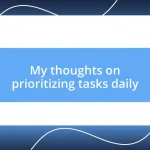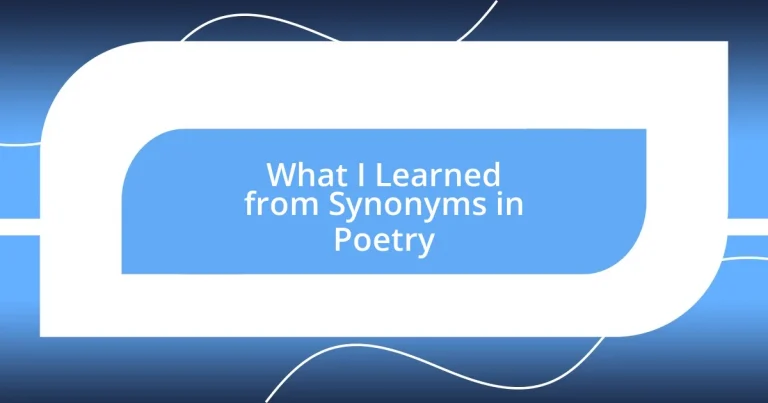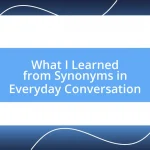Key takeaways:
- Synonyms are powerful tools in poetry that can significantly alter emotions, imagery, and overall meaning.
- Techniques like reading aloud, visualizing words, and experimenting with context can enhance synonym selection for deeper emotional resonance.
- Engaging in exercises such as creating a synonym journal and analyzing poems promotes a richer understanding of word choice and its impact on readers’ connections to poetry.
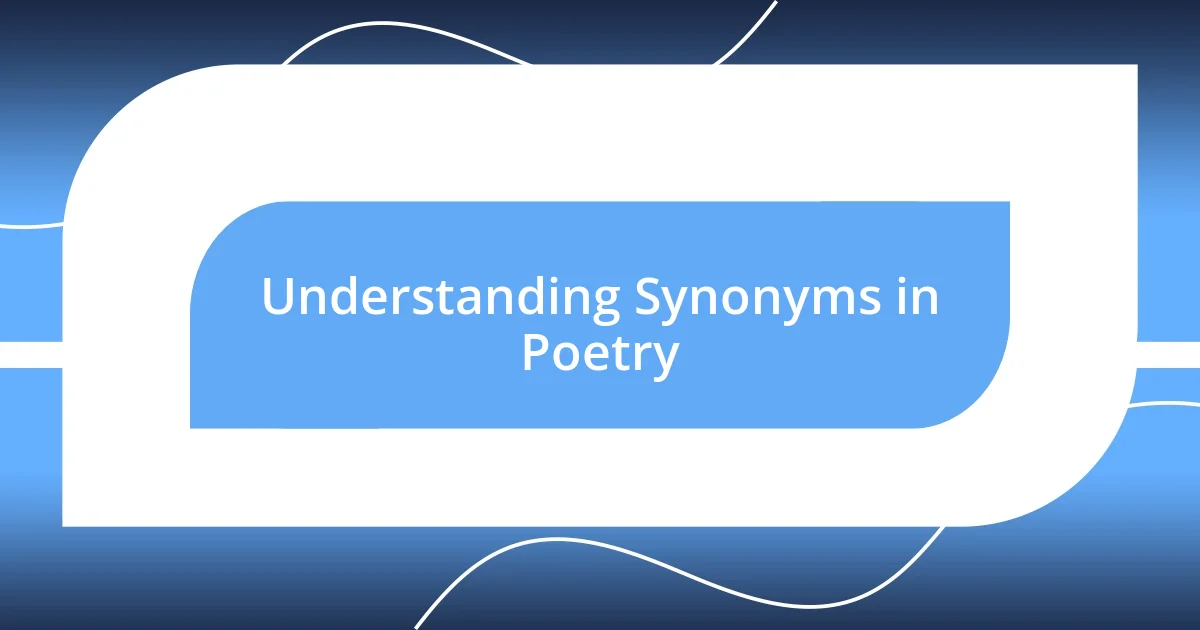
Understanding Synonyms in Poetry
When diving into the world of poetry, I quickly realized that synonyms hold a special power. At first, I thought they were merely interchangeable words, but I discovered they’re so much more. For instance, consider the difference between “happy” and “joyful.” Each word carries a unique nuance, allowing poets to evoke distinct feelings and atmospheres.
Reflecting on my own experiences, I remember writing a poem about winter. I initially used “cold” but later switched it to “frigid.” The shift transformed the imagery, making it sharper and more evocative in the mind’s eye. Isn’t it fascinating how a single word choice can alter the emotional landscape of an entire piece?
By employing synonyms, poets can create layers of meaning that enrich their work. Have you ever read a line and felt a sudden connection due to a specific word? That’s the magic of synonyms; they help convey the poet’s voice and intention, connecting us to the emotions behind the words in a profound way.
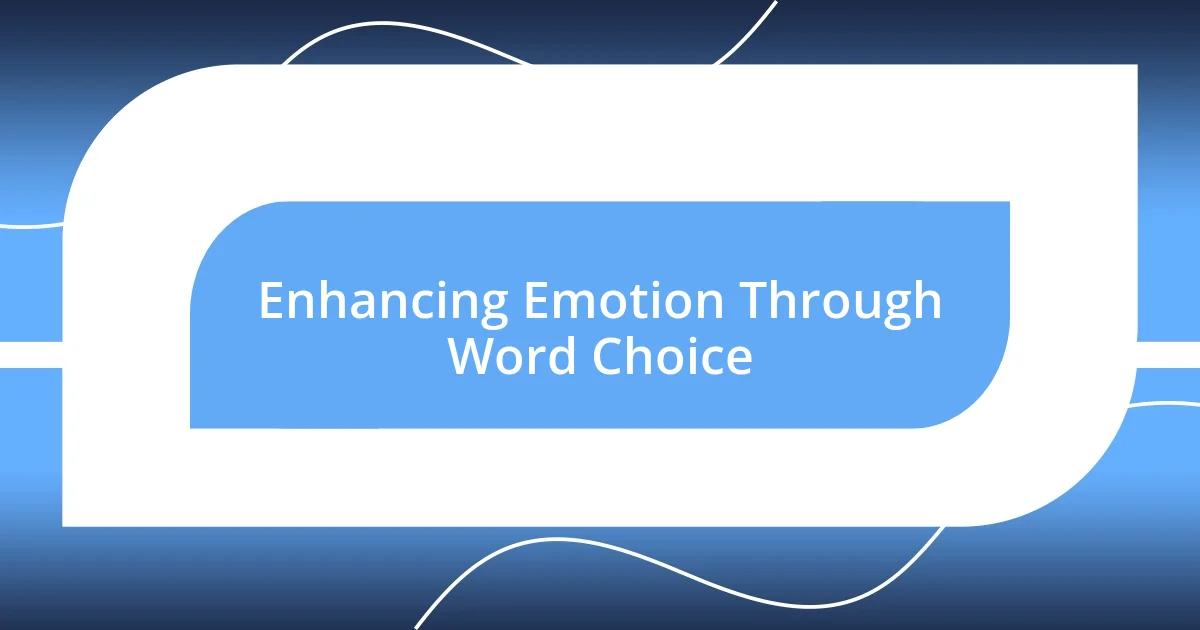
Enhancing Emotion Through Word Choice
When I think about how a poet selects their words, the emotional intensity becomes remarkably clear. For instance, I once switched “sorrow” to “anguish” in one of my poems about loss. The impact was immediate; “anguish” captures a deeper, rawer pain that resonates more profoundly with readers. Have you ever noticed how changing just one word can make you feel a whole new range of emotions?
In my experience, word choice can create vivid imagery that connects the reader to the poet’s feelings. I experimented with “whisper” instead of “speak” in a piece reflecting on secrets. The change transformed the intimacy of the line, making the moment feel fragile and vulnerable. It’s this subtle shift that draws readers further into the emotional core of the poem, where real connection happens.
Ultimately, I believe the emotional weight of poetry lies in the careful selection of words. This strikes me as a powerful tool—something akin to a painter choosing the perfect hue. When I replaced “fear” with “dread,” it painted a much darker picture, encapsulating a heavier burden. It’s almost magical how the right synonym can transport you, immersing you in the world the poet has carefully crafted.
| Word Choice | Emotional Impact |
|---|---|
| Cold | Detachment |
| Frigid | Sharp Isolation |
| Sorrow | Pain |
| Anguish | Deep Suffering |
| Whisper | Intimacy |
| Speak | Neutral Communication |
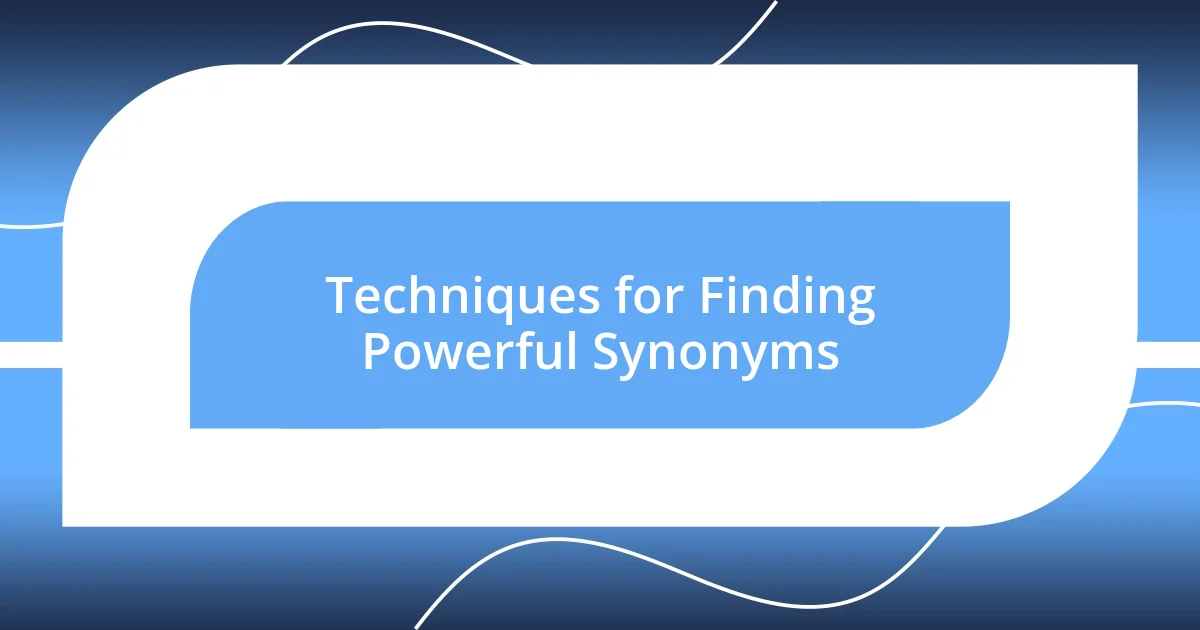
Techniques for Finding Powerful Synonyms
Finding powerful synonyms involves a deliberate approach to word selection, often informed by context and emotional resonance. One technique that has worked for me is reading a poem aloud. When I hear the cadence and rhythm, it helps me pinpoint words that might carry more weight. Just recently, while revising a piece, I stumbled upon the phrase “time stood still” and considered alternatives like “time froze” or “time halted.” I found that each option conjured different feelings.
Here are a few techniques to help you discover synonyms that pack a punch:
- Read Aloud: Hearing the words can highlight which synonyms resonate best.
- Use Thesauruses Creatively: Explore not just synonyms, but related words that might uncover new meanings.
- Visualize Your Words: Picture the image each word conjures in your mind; the stronger the image, the better the synonym.
- Experiment with Context: Try your synonym in different sentences to see how it shifts the tone.
- Reflect on Emotion: Ask yourself what feeling you want to evoke and choose a synonym that aligns with that intent.
I remember a moment when I searched for synonyms to enhance a nature poem. I started with “beautiful,” but when I explored “breathtaking” and “sublime,” the energy shifted dramatically, inviting the reader to feel that awe. This process, I believe, opens doors to poetic expression that sometimes we don’t even realize are there.
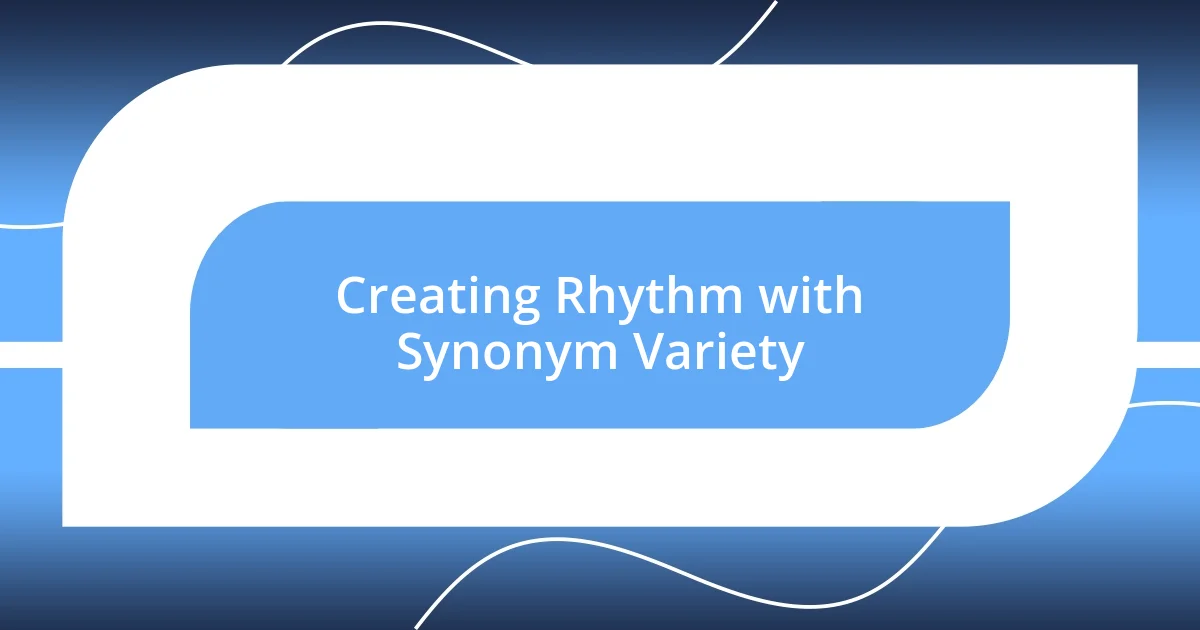
Creating Rhythm with Synonym Variety
When I think about rhythm in poetry, synonyms play a crucial role in shaping not just the meaning but also the flow. I once used “dance” instead of “move,” and the poem felt lighter, almost whimsical. Isn’t it fascinating how a single word can transform the tempo? Each synonym brings its own cadence, contributing to an overall musicality that can elevate a line from ordinary to enchanting.
As I explored my own work, I noticed how varying synonyms within a stanza can create a captivating heartbeat. For instance, alternating “fade,” “whisper,” and “vanish” in one of my poems about time added a hypnotic rhythm that drew the reader in. It felt almost like a wave, where each word choice ebbed and flowed seamlessly, enhancing the emotional and rhythmic experience. Have you felt that pull from a well-crafted piece, where the words feel like they’re dancing off the page?
In moments of revision, I often challenge myself to seek out five different synonyms for a key word in a line. Recently, while writing about the night sky, I experimented with “darkness,” “obscurity,” “shadow,” “night,” and “gloom.” Each iteration had its unique timbre that shifted the energy of the poem entirely. I discovered that the right synonym could not only alter meaning but also influence how the poem felt as it was read aloud. Isn’t it exhilarating to find those gold nuggets that resonate perfectly with your poetic rhythm?
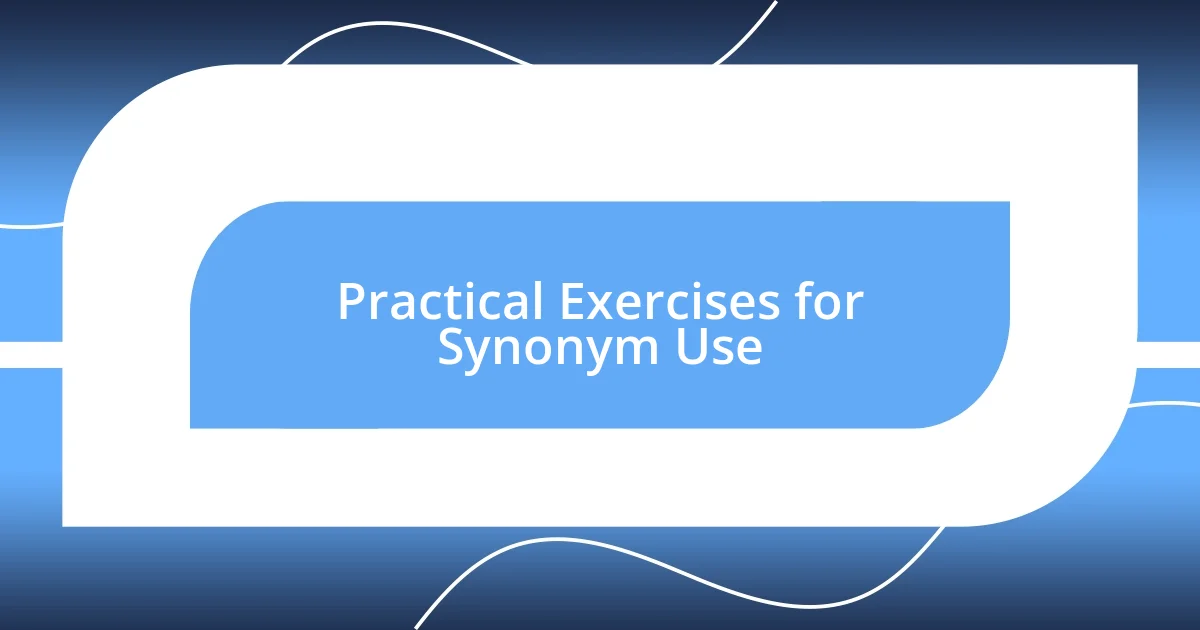
Practical Exercises for Synonym Use
One of the most practical exercises I’ve found is to create a “synonym journal.” I jot down a word I frequently use, like “happy,” and then list ten alternatives with varying nuances—words such as “joyful,” “ecstatic,” or “content.” What I love about this activity is how it encourages me to sit with each word and reflect on the emotional weight it carries. Have you ever realized that sometimes, the simplest words can mask the depth of feeling you want to convey?
Another engaging practice is writing short poems using only synonyms of a key word. For example, when I focused on the word “love,” I crafted a piece solely with “affection,” “devotion,” “adoration,” and “fondness.” This exercise not only challenges creativity but also highlights the subtle differences in each synonym’s connotation. While doing this, I felt a renewed appreciation for the various shades of emotion conveyed through seemingly similar words. Isn’t it intriguing to see how your perspective shifts with different word choices?
To shake things up, I enjoy playing synonym games with friends or fellow poets. We take turns picking a word and challenging each other to come up with as many synonyms as possible within a time limit. One afternoon, we tackled “scared,” and while I started with “afraid,” we cascaded through terms like “terrified,” “anxious,” and even “spooked.” It was a playful way to deepen our understanding of word choice, and it brought out so many laughs while simultaneously enriching our vocabularies. Reflecting on this, I realize how powerful words are in building connections and evoking feelings. Have you ever experienced that rush when a perfect synonym clicks into place?
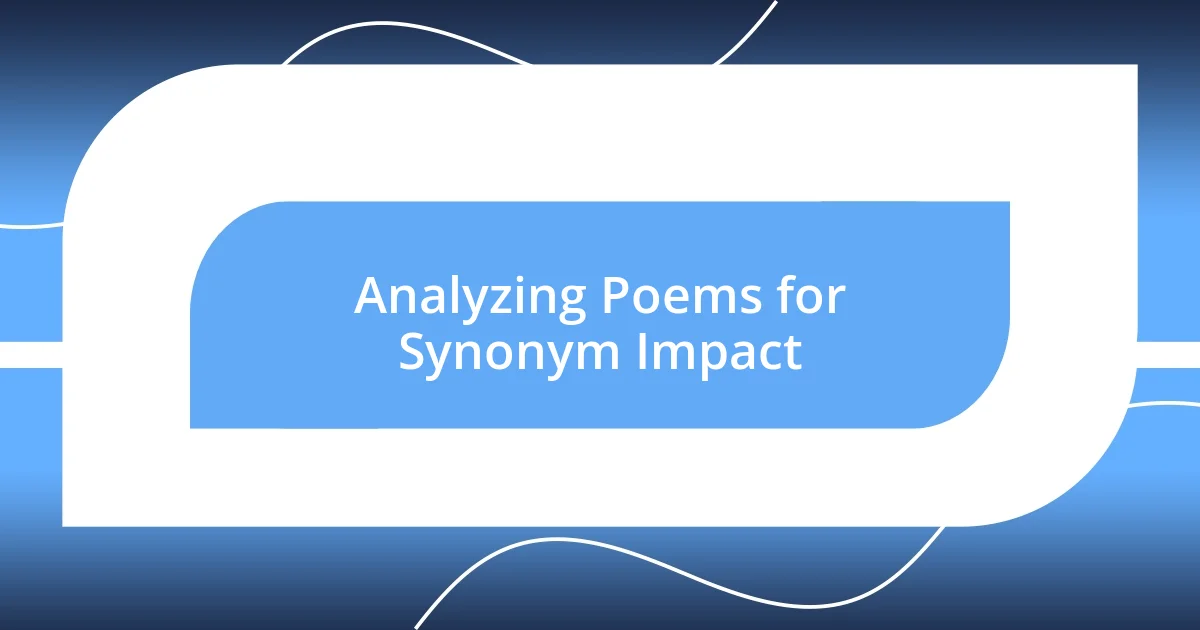
Analyzing Poems for Synonym Impact
Analyzing synonyms in poetry has become one of my favorite pastimes. I remember dissecting a poem line by line, identifying how the choice of “ecstatic” over “happy” shifted not only the tone but also the imagery. Each synonym carries its vibrancy, inviting readers into a more nuanced emotional landscape. How often do we overlook these subtle layers that can transform our understanding of a poem?
During my analysis, I’ve discovered that synonyms can create unexpected contrasts. In one of my poems, I chose “love” and “desire” to evoke two sides of a complicated relationship. The clash between these synonyms underscored the tension I aimed to portray. This led me to wonder: do we consciously think about the power of such word pairs in the emotion they evoke within a piece? Analyzing these choices has helped me appreciate the dance of language in a much deeper way.
Engaging with different poems, I’ve often felt inspired to jot down my reactions to their synonym choices. One striking example was a poet who used “sorrow” alongside “melancholy.” The interplay of these words resonated deeply, sparking memories of my own experiences with sadness. Reflecting on this, I find it essential to ask: how do these synonyms shape our connection with the poem’s emotional core? In my experience, they can serve as bridges that connect us to our feelings, revealing insights we might have otherwise overlooked.








